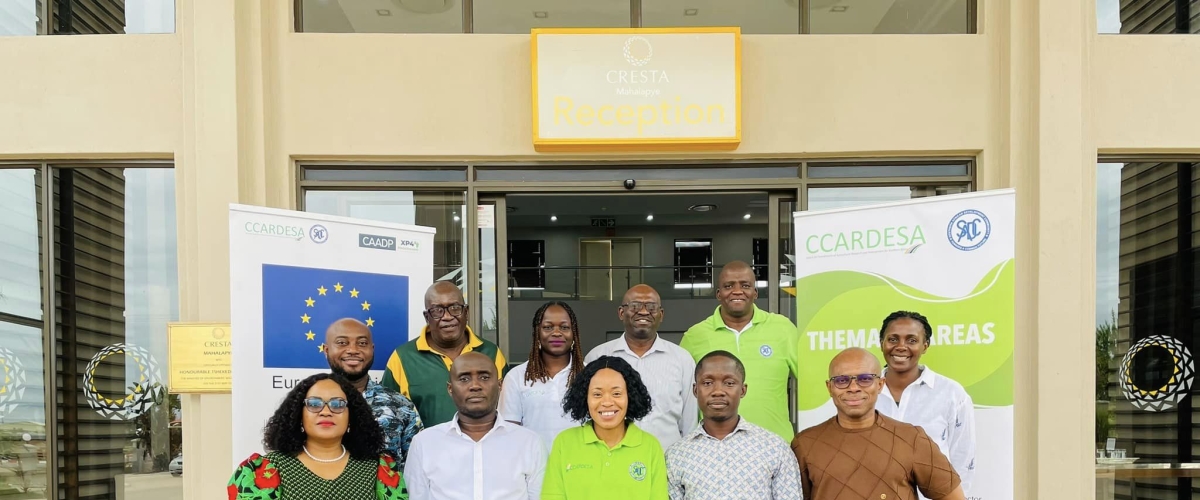
The partnership between the Center for Coordination for Agriculture Research and Development in Southern Africa (CCARDESA) and the Forum for Agriculture Research and Development in Africa (FARA) is breaking new ground in the interoperability of agricultural research systems. This initiative began its journey in Akosombo, Ghana, in November 2021, saw a pivotal moment with a comprehensive training session in Mahalapye, Botswana, from February 26th to March 1st 2024. As part of the ongoing work in implementing the programme, FARA, AFAAS and SROs have been working jointly and are making great effort in aligning the Knowledge Management and M&E systems to support integration, interoperability, and harmonization of reporting, learning and outreach of the programme results.
The training aimed to equip CCARDESA staff with the necessary skills for the Monitoring Evaluation Learning (MEL) Systems and foster a seamless integration with the CAADP-XP4 Consortium Monitoring Evaluation and Learning System (MEL), and Knowledge Management (KM) Systems. This bilateral engagement initiated by FARA with SROs and AFAAS, in line with the CAADP-XP4 activities to promote a better understanding of the "2020 Akosombo Integration Agenda for Knowledge Management & M&E" and the central M&E and KM systems being used to achieve interoperability amongst the existing systems used by CAADP-XP4 institutions. The aim of this engagement was to strengthen cooperation amongst the implementing partners.
During the opening of the meeting, Dagmore Tawonezwi, CCARDESA's Monitoring and Evaluation Officer, stressed the importance of operationalising the CCARDESA MEL-MIS and ensuring compatibility between the MEL and KM systems with FARA. He emphasized that there is a pressing need to have the system up and running so that all the work can be easily accessible at the fingertips.
The training endeavored to achieve several critical goals, including the capacity building of CCARDESA's staff on the MEL-MIS System to improve planning and reporting as well as the development of Application Programming Interfaces (APIs) to integrate KM and M&E Systems between the CCARDESA and FARA MEL and KM systems.
Futhi Magagula, CAADP-XP4 Programme Officer, laid out the purpose of the training, stating, "The overall objective is to build the capacity of selected CCARDESA staff on the MEL-MIS System to enhance planning and the quality of reporting at all levels and to create interoperability of the MEL and KM systems."
The training brought together a diverse group of M&E Specialists, KM specialists, Finance, and IT professionals from CCARDESA and FARA. Participants from both institutions shared their expertise on the technical and strategic facets of the M&E and KM systems, setting a solid foundation for the successful integration of these platforms.
Anselme Vodounhessi, FARA Monitoring, and Evaluation Specialist shared insights on the envisioned integration, emphasizing the comprehensive compendium of indicators that would emerge from this collaboration.
The consultancy firm that developed the CCARDESA MEL-MIS system, Data Care was instrumental in building the capacity of CCAREDESA staff on the workplan, result frameworks, and reporting modules. Integrating the programmes/project plans and result frameworks into the CCARDESA MEL-MIS system marks a significant milestone.
The meeting ended positively, with Futhi Magugula expressing relief and excitement for the future. She said the interoperability activity has been a persistent issue for a while, and it is a great relief to see it finally come to fruition. She further stated that CCARDESA is grateful to Data Care for their crucial role in developing the system and providing additional support to ensure it is functional. She eagerly awaits the official handover of the CCARDESA MEL system to CCARDESA management.
She thanked the FARA team for providing technical support and their commitment to ensuring that the consortium partners’ M&E and KM systems are interoperable to advance the interoperability initiative that promises to transform agricultural research and knowledge sharing across Africa.
The training was made possible through the CAADP-XP4 programme funded by the European Union, administered by the International Fund for Agricultural Development (IFAD), and the World Bank through the Food Systems Resilient Programme.





